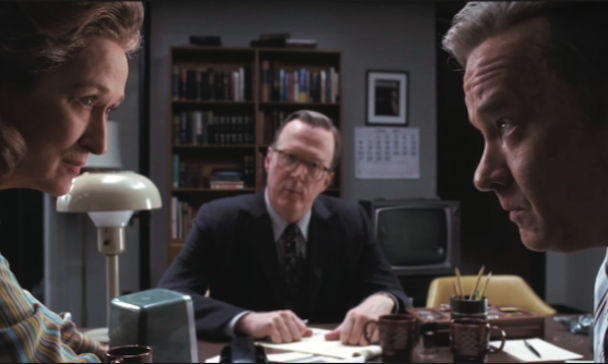‘The Post’ inspires freedom of the press in modern-day journalism

By Jennifier Zeleski: A&E Editor
The Post, a Golden Globe nominated film directed by Steven Spielberg, and featuring Meryl Streep and Tom Hanks, follows Katherine Graham (Meryl Streep), the publisher of The Washington Post newspaper during the Watergate scandal, and Ben Bradlee (Tom Hanks) as the Editor-in-Chief at the time.
After seeing the trailer for the movie just a few months ago, I was already hooked on getting to see it as soon as it was released. Not only did it include Hollywood royalty, it was a journalism-based movie, coming out at a time in our nation’s history where the media’s impact is continuing to evolve and change every day, just as it had when the initial news of the Watergate scandal was exposed to the American people. It was clear that this film would have references to themes that are still apparent today, and I couldn’t wait to identify them all, hoping to leave the theater motivated and inspired in my own journalistic career.
From the opening scene, the viewer has a first-hand look at the brutality of the Vietnam War, and I found these visuals essential to the development of the plot. Getting to see an example of the brutality the soldiers had to endure was captivating although ultimately upsetting, but I was grateful it was incorporated into the film. Without being thrown into the atmosphere of Vietnam, the viewers would have been left to wonder and imagine on their own, and they wouldn’t have been able to truly experience some of the authenticity the scene itself offered.
After the initial opener, the film was a testament to journalism at its finest. There were plenty of visual scenes that were identifiable to anyone involved in the journalism industry prior to the digital realm. There were open-concept newsrooms with dozens of typewriters – some of which were most likely from Tom Hanks’ personal collection – envelopes with classified information and even layout pages with mark-ups for the next newspaper cover. But aside from geeking out about the journalism-themed visuals, Spielberg did an incredible job communicating themes of the film without setting up any dialogue, or in some instances, even without any eye contact.
Although they did a good job with including the women’s rights emphasis, I thought they made Graham out to be a little weaker and doubtful than she came across as in reality. After reading parts of her lengthy autobiography, she had an internal voice that seemed strong, with an incredible memory and plenty of intelligence. I think she deserved to come across as someone who was a little more strong-willed due to what she had endured, and what she would continue to come across while being publisher. Aside from the film including a little too much weakness on her part, I thought Bradlee’s role was done well. Hanks’ portrayal was so believable throughout his character development that you hardly realized it was him within the film’s context. He morphed from editor, to husband, to defender so seamlessly that you couldn’t help but believe him. Not only did his role portray a typical editor-in-chief, but it also opened up opportunity for emphasis on the lack of women in the newsroom. Whenever Bradlee would call a meeting with the editorial staff, there was only one female editor who led a section of the paper, one that they continuously mocked and criticized throughout the film: the new style section. I found this to be indicative of how newsrooms can still be seen today, with many men still leading hard news sections and sports sections, while women can potentially be put on “softer topics”. It displayed that women have a place in the newsroom, but we’re still working for it.
Without giving away the inspiring and memorable moments from the movie, I ultimately found it to be a decent representation of what Graham went through during the beginning of the Watergate scandal, and Spielberg did a great job on making the movie relevant to today’s society, while making it look as if it had been filmed in the 1970’s. If you’d like to see a great example of how true journalism can make a reverberating impact on American society, and a solid defense as to why we cannot get rid of “Freedom of the Press” within the First Amendment, I highly suggest seeing The Post. To leave you with one of my favorite summarized quotes from the film, the press has no obligation to the government, but it does to the governed.